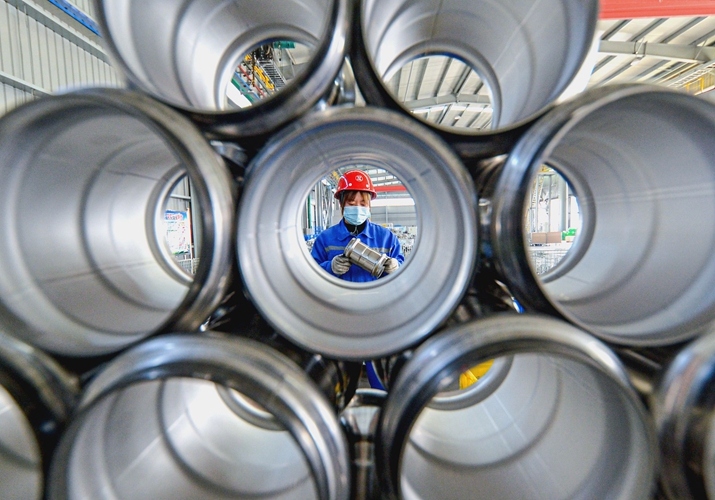| Editor's Choice |
| Key economic conference sets tone for 2021 | |
| By 2019, carbon emission per 10,000 yuan ($1,530) of GDP decreased by 48.1 percent compared with 2005 | |
|
|
 A special tube material workshop in Handan, Hebei Province in north China, on December 18,2020(XINHUA)
"Extremely extraordinary." This was the top policymakers' conclusion on 2020 as they took part in the Central Economic Work Conference in Beijing from December 16 to 18, 2020, the annual meeting held to review the year's performance and lay out the goals for the next.
With economic achievements hard won amid control of the novel coronavirus disease (COVID-19) but not yet consolidated, and 2021 being a crucial year marking the beginning of the new five-year plan period, the meeting set forth macro policies as well as specific tasks.
No sharp turns
In 2021, the macro policies will remain consistent, stable and sustainable, the fiscal policy proactive and the monetary policy prudent.
On one hand, the economy is expected to return to normal track in 2021, so the supportive policies instituted in response to the epidemic would be withdrawn in a gradual and orderly manner. But on the other hand, uncertainties still remain in the form of the ongoing pandemic in the rest of the world and sporadic cases in China.
"The proactive fiscal policy will be tightened up, but not too much," Zhao Quanhou, Director of the Financial Research Center, Chinese Academy of Fiscal Sciences, told 21st Century Business Herald. He said it is expected that fiscal revenue would increase by over 5 percent in 2021 with a high pace of economic growth. Last October, the International Monetary Fund estimated it would rise by 8.2 percent. As production resumes overall, the deficit-to-GDP ratio could be reduced to 3 percent from more than 3.6 percent in 2020.
Last May, the government announced it would issue special bonds for COVID-19 control worth 1 trillion yuan ($153 billion) in the year to create more funds for companies and individuals. With epidemic response measures still in place, Zhao called for new special bonds on the same scale as 2020.
Zhang Yongjun, deputy chief economist of the China Center for International Economic Exchanges, told the media that fiscal support including more public investment helped enterprises cope with the impact of the epidemic. However, the projects cannot be finished short term, so the policy support should remain consistent.
Currently some local governments are facing funding pressure. The money for major national tasks should be spent still, while non-essential expenditure should be reduced to prevent debt risks, Dong Yu, Executive Vice President of the China Institute for Development Planning at Tsinghua University, told Xinhua News Agency.
The meeting also said it's essential to keep the monetary policy flexible, targeted, reasonable and moderate, stabilize the leverage ratio and balance the relations between economic recovery and risk prevention.
It stressed that the increase of money supply and social financing should basically match the nominal economic growth. Since the acceleration of money supply in 2020 was higher than the nominal GDP growth rate, Zhang said it should be lower than the nominal rate this year. In 2021 the GDP is predicted to rise by about 8 percent year on year, so the money supply will be almost the same as in 2020.
Choke points
Technological advancement has been prioritized. Experts said it is in line with the spirit of the Fifth Plenary Session of the 19th Communist Party of China (CPC) Central Committee in October 2020, which underlined the importance of scientific self-reliance and independent innovation.
"A new technological and industrial revolution is booming and cutting-edge technologies have advanced, becoming the leading force in reshaping the global landscape. To seize the opportunity and claim a leading position, major economies have launched national-level innovation strategies," Sui Jigang, a researcher with the Institutes of Science and Development, the Chinese Academy of Sciences (CAS), told Beijing Review.
China's manufacturing is large in scale but not strong in competitiveness, and some key and core technologies and high-end equipment depend on imports. These drawbacks mean currently China cannot meet the demand of high-quality development, Sui said.
The meeting emphasized the roles of the government, universities, enterprises and researchers in strategic technological development, highlighted international cooperation, an incentive system and ethics, and encouraged establishing basic research and innovation centers.
It called for intensified efforts to build more independent industrial and supply chains and address the chokehold for technological advancement by cultivating unique skills.
"In the long term, it is conducive to the modernization of China's industrial and supply chains against the backdrop of the escalating trade frictions with the U.S.," Lu Yue, a professor at the Beijing Open Economy Research Institute, University of International Business and Economics, told Beijing Review.
The U.S. restrictions on Chinese telecom company Huawei to cut off its access to U.S. technology-backed components are a reminder for China to enhance its innovation and upgrade its position on the value chain.
Lu said it's important to improve every link in the entire industrial chain, from designing, research and development to production, especially the production of high value-added and high-quality intermediate goods.
According to the CPC Central Committee's proposals for formulating the 14th Five-Year Plan (2021-25) and long-range objectives through 2035, in the future, the focus should be on 5G, artificial intelligence, quantum information, aerospace technology and biomedicine. Integrated circuits, semiconductors, new energy, the industrial Internet, the Internet of Things, cloud computing and blockchain would also be prioritized. So would be public health and epidemic prevention.
Efficiency in independent innovation is key to enhancing adaptability, according to Lu. Although China overtook the U.S. as the top source of international patent applications filed with the World Intellectual Property Organization in 2019, the effectiveness of investment to improve productivity and the commercialization of technologies needs to be elevated, she said.
Seeds are also on the agenda. Li Jing, a research fellow with the Institute of Botany at CAS, said though China is an agricultural country, its seed technology lags behind developed countries'. Although the domestic output of rice and wheat seeds is high, farmers rely highly on imports for vegetable seeds. "Quality gaps have resulted in higher prices of foreign seeds," she added.
According to the Ministry of Agriculture and Rural Affairs, China imported $475 million worth of grain seeds and $228 million worth of vegetable seeds in 2018.
"An advantage in seeds will help in market competition, prevent excessive trade deficit in agriculture and improve the overall quality of international agricultural products," Li said.
 The deep-sea manned submersible Fendouzhe finishes a dive on November 28, 2020, in the Mariana Trench, the deepest part of Earth's oceans, located in the western Pacific Ocean(XINHUA)
Two markets
In 2021, China will take a solid first step in building the new development paradigm in which the domestic and foreign markets reinforce each other, with the domestic market as the mainstay.
The meeting underlined the need for supply-side structural reform under the new paradigm, while putting forward demand-side management for the first time.
"A strong domestic market will be a solid base for the new paradigm," Lu said. Also, the supply system should be more adaptable to domestic demand so that demand can guide supply while new supply creates new demand. This is a dynamic balance between the two and is conducive to boosting domestic economic dynamics and responding to the impact of the epidemic.
Employment, improved social security, optimized income distribution and expanded middle-income population are the most fundamental factors for upgrading consumption, Lian Ping, chief economist of Zhixin Investment, an investment company in Shanghai, wrote in an article in December 2020.
Investment is another important factor. Lian recommends investment in new infrastructure such as 5G networks and data centers, new urbanization, and major transportation and hydraulic engineering projects. His priorities also include the digital economy and manufacturing equipment.
The meeting said China will consider joining the Comprehensive and Progressive Agreement for Trans-Pacific Partnership (CPTPP), a free trade agreement among 11 Asia-Pacific economies.
"It is a big move after signing the Regional Comprehensive Economic Partnership (RCEP) agreement," Lu said. "Participation in the CPTPP will forge a new landscape for win-win cooperation."
In November 2020, the RCEP was signed after eight years of negotiations, creating the largest trading bloc in the world. The 15 participating countries, including 10 member countries of the Association of Southeast Asian Nations plus China, Japan, the Republic of Korea, Australia and New Zealand, account for some 30 percent of the global population, global GDP, as well as global trade.
Prominent tasks
Preventing unreasonable capital expansion will receive greater importance in 2021.
Huang Jin, Deputy Director of the Institute of International Law of Chinese Academy of Social Sciences, said while the platform economy has become a new star in economic recovery and innovative growth, enhancing China's international competitiveness in online consumption, the problems embedded in it are threatening its sustainable development.
In late December 2020, six Internet giants, including Alibaba, Tencent and JD.com, were rapped over their extreme price wars and some irregularities in the market of community group buying, a location-based service that allows residents to bulk purchase daily essentials and groceries through a community leader. Their cutting-throat competition has raised fears that it may create monopoly and drive small vendors and traditional retailers out of business. In response, the State Administration for Market Regulation and Ministry of Commerce have issued new regulations to discipline market players.
"Anti-trust laws are a major way to cope with market malfunction," Huang told Beijing Review. The meeting listed anti-monopoly supervision as one of the key tasks, saying laws and regulations concerning the identification of platform monopolies will be improved.
Regarding the housing issue in big cities, the meeting directed ensuring affordable rental housing and regulating the long-term rental housing market.
In November 2020, Danke, one of the largest online home rental platforms in China, failed to pay the home owners from whom it was leasing apartments on long term to rent them out. The owners subsequently began evicting the tenants though the latter had paid, often a year's rent, to Danke. The case exposed the problems of the long-term rental housing market.
The meeting emphasized the development of non-profit rental housing and improvement of long-term rental housing policy. As part of the government efforts to promote the market, land supply for rental housing projects will be increased.
For carbon dioxide emissions, the Chinese Government has pledged to have carbon dioxide emissions peak before 2030 and achieve carbon neutrality before 2060.
By 2019, carbon emission per 10,000 yuan ($1,530) of GDP decreased by 48.1 percent compared with 2005. This exceeds the target of 40-45 percent between 2005 and 2020. The year 2021 is a new start for the targets in 2030 and 2060.
(Print Edition Title: Growth Goals)
Copyedited by Sudeshna Sarkar
Comments to zhangshsh@bjreview.com
|
|
||||||||||||||||||||||||||||
|